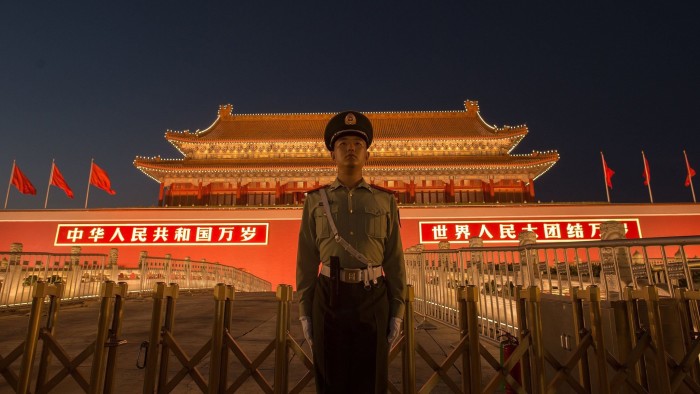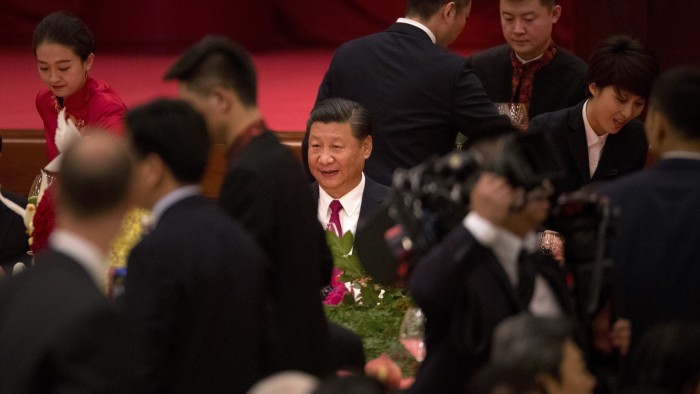Under Xi Jinping, China is turning back to dictatorship
Simply sign up to the Chinese politics & policy myFT Digest -- delivered directly to your inbox.

This year, a Chinese court sentenced a man to two years in prison for the apparently heinous crime of referring to President Xi Jinping as “steamed bun Xi” in private messages he sent to friends using online chat apps.
The sobriquet has been censored in China since 2013, when online ridicule erupted at Mr Xi’s attempt to portray himself as a man of the people by visiting a steamed bun restaurant. But prosecuting someone for using the phrase in private discussions is a new and worrying development.
Wang Jiangfeng was found guilty of sending online messages to friends through the Tencent-owned WeChat and QQ messaging apps that caused “negative thoughts about the Chinese Communist party, the socialist system and the people’s democratic dictatorship, causing psychological confusion and public disorder of a serious nature and particularly egregious kind”. In recent weeks, for added measure, the judicial authorities disbarred the lawyer who defended Mr Wang.
This is how dictatorships behave and China looks more like one than at any time in several decades.
Next Wednesday, the leaders of the ruling Communist party will meet to anoint Mr Xi for his second five-year term as the chairman of everything. In the past five years, he has consolidated power, purged rivals and encouraged a personality cult to a degree not seen since the death of Mao Zedong in 1976.
Observers in China and beyond will be watching closely for signs Mr Xi intends to break recent precedent and stay in power past 2022, when he would normally be expected to step aside.
But the reality is we know almost as little about the inner workings of China’s top leadership as we do about North Korea’s. What we do know is what Mr Xi tells us, in his speeches and in the political slogans he coins. His own words reveal that the biggest and most important change under his watch has been the complete rejection of democracy and other “western values” such as free speech, constitutionalism, judicial independence and human rights.
Ever since the former paramount leader Deng Xiaoping came to power in the late 1970s, China has moved inexorably, if haltingly, towards more personal and even political freedom.

For decades the debate in top policymaking circles in Beijing was always about the pace of change, while the direction — more freedom of speech, judicial independence and ultimately democracy — was hardly ever questioned.
In numerous private conversations over the years senior (sometimes very senior) party cadres would tell me that western-style democracy was the goal for China, but the transition must be gradual and carefully sequenced so as not to unleash chaos. Nobody is saying that now.
For the first time in nearly four decades there is not even a suggestion that China is moving towards building civil society or letting its people have more say in how they are governed. Instead, Mr Xi offers them a vague notion of “great rejuvenation” that borrows heavily from the premodern era of godlike emperors who ruled “all under heaven”.
The rejection of “western” political systems has been made easier recently by what the Chinese see as the ludicrous buffoonery of Donald Trump and, to a lesser extent, the self-inflicted damage of Brexit and EU infighting.
As a top foreign policy adviser recently told one of my colleagues: “Trump never talks about democracy or American leadership or liberty — we should not be so stupid to worship things that in the western world are now in doubt.”
Given the perceived failings of liberal democracy, many, perhaps most, Chinese are quite willing to accept creeping dictatorship and political persecution of individuals as long as they continue to see their livelihoods improve.
Outside China many in the west will shrug and ask what all this has to do with them. But they should be aware that Mr Xi’s other big shift has been to jettison the foreign policy mantra of non-interference that has also guided China since the days of Deng.
Deng famously said China should “hide its light and bide its time” on the world stage and steadfastly refrain from meddling in other countries. Mr Xi sees things very differently and has ordered the party and state apparatus to be far more active abroad in defending China’s interests — as defined by the autocratic party and the people who run it.
It is already a sad reality that many people outside China with links to the country — journalists, academics, diplomats, expatriate Chinese businesspeople — would think twice about using a Chinese-owned app like WeChat to send a private message mocking China’s current leader.
Letter in response to this column:
We must up our game on China while we still can / From Tim Clissold, Easby, N Yorks, UK
Comments